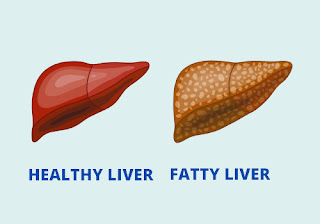Top 21 Foods to Avoid with Fatty Liver Disease

If you’re looking the foods to avoid with fatty liver disease, you need to be careful about the kinds of foods that you eat. A fatty liver is a condition in which your liver accumulates too much harmful fat. It can also be caused by various other factors, including alcohol drinking, lack of exercise, and being overweight.
If you’re struggling with fatty liver, avoiding foods high in fat is essential. This includes fried foods prepared in a way that contains lots of oil or butter.
In addition to avoiding fatty foods, it’s also important to drink plenty of water, exercise regularly, and monitor your blood sugar levels.
In This Article
Foods to Avoid with Fatty Liver Disease
Here are the most common fatty liver foods and drinks and what you should do to avoid them.

1. Refined Grains
The best way to avoid fatty liver is to reduce your intake of refined grains. These include white bread, pasta, cereal, and other sugary snacks. Not only are these foods high in carbs and sugar, but they also promote the development of fat cells in the liver.
2. Processed Foods
Processed foods generally contain unhealthy ingredients and additives that can contribute to your risk of developing fatty liver. They also contain refined carbohydrates that spike your blood sugar levels and cause adverse effects on your health, including obesity and diabetes.
3. Fatty Meat
Fatty meat is one of the primary sources of harmful fat, and overeating can lead to fatty liver. However, some general recommendations that may be useful for people with fatty liver include avoiding high-fat meats, saturated fats, and unhealthy fats in general.
4. High-fat Dairy Products
These include foods made from dairy products, such as milk, cheese, and cream. It’s essential to stay away from these types of foods if you want to avoid developing fatty liver.
5. Sodas, Cold Drinks, and Sugar
Soda is the main contributor to obesity and other chronic diseases and causes fatty liver. Studies have found that soda drinkers have a 2.5 times higher risk of developing fatty liver compared to those who don’t drink soda.
6. Saturated Fats
Saturated fats are the worst for your liver because they cause it to build up in the liver cells. This can lead to fatty liver, a condition in which the liver becomes full of “fatty droplets” and starts to malfunction.
Some of the most common foods that contain high levels of saturated fats are- Butter, Cheese, Red Meat, and Fried Foods.
7. Alcohol
Drinking alcohol can damage your liver in many ways. First and foremost, it increases your risk of developing alcoholic hepatitis, an liver inflammation caused by drinking alcohol. This condition can lead to permanent damage to your liver and even death.
8. Sugary Drinks
Beverages such as soda, energy drinks, sweetened tea, and fruit juice are all high in sugar and can increase blood sugar levels, contributing to liver inflammation.
9. Foods with a Sugar Coating
Foods with a sugar coating include fruits, fruit juices, sweetened cereal, sugary drinks, and candy. These foods are highly addictive and can cause your body to become addicted to them. In addition, they can also increase your risk for obesity and liver disease.
10. Processed Foods
These often contain unhealthy fats, additives, sweeteners, and other ingredients that can damage the liver over time.
11. Herbal Supplements
Several herbal supplements are not well-known or tested for safety. As a result, it’s essential to be aware of the potential risks associated with these products before using them.
12. Canned Foods
Canned foods are high in calories and contain a lot of unhealthy fats. This is why avoiding fatty liver is essential by eating healthy diets that include plenty of fruits and vegetables.
13. Fried foods
Fried foods contain a high amount of refined carbohydrates and unhealthy fats and oils, which can lead to the development of a fatty liver.
14. Sweets
These contain a lot of sugar which can lead to an increase in blood sugar levels, which in turn can cause your liver to become fat.
15. Baked Foods
These are often high in sugar and other unhealthy ingredients and can significantly contribute to developing a fatty liver.
16. Artificial sweeteners
These include aspartame, sucralose, saccharin, and stevia. They can have a negative impact on your blood sugar levels and lead to weight gain and other health problems.
17. Salt
Too much salt intake can also lead to fatty liver disease, as it can damage the liver cells that help metabolize fats and proteins.
18. French Fries
French fries are high in calories and nutrients, which can lead to weight gain and an unhealthy liver. They contain significant amounts of saturated fat, which is bad for your heart and can damage your liver.
19. Oily fish
Oily fish like salmon, mackerel, and herring are the most common culprits. These fish are loaded with unhealthy fats and cholesterol, which can lead to a fatty liver.
20. MSG Preservatives
Other common culprits behind fatty liver are MSG. This compound is used as a preservative in many processed foods and has been shown to promote inflammation and damage the liver cells. Therefore, you must be careful about what you eat and drink to keep your liver healthy.
21. Rice, pasta, and white Bread
Rice, pasta, and white bread are all high in carbohydrates and contain a lot of sugar. They can also be very harmful to your liver if you eat them regularly.
Conclusion
The secret behind preventing fatty liver is to include healthy lifestyle habits like going for a walk, doing yoga, and avoiding sugar. But remember, it’s not just about foods to avoid with fatty liver disease from your plate. It is also essential to lead a healthy lifestyle by eating right.
Be sure to read
- Is it Dangerous to Use Phone While Charging
- Morning Habits that Cause Weight Gain
- Is Olive oil Good for Fatty Liver
References
- Food and Nutrition in the Pathogenesis of Liver Damage
- Nutrition in Patients With Cirrhosis
- (PDF) Dietary Interventions in Liver Diseases





